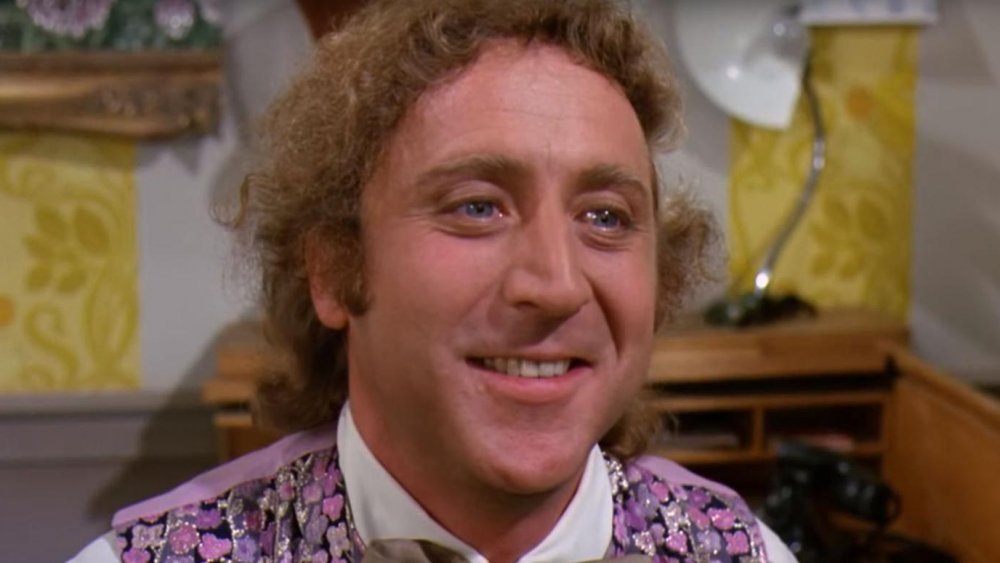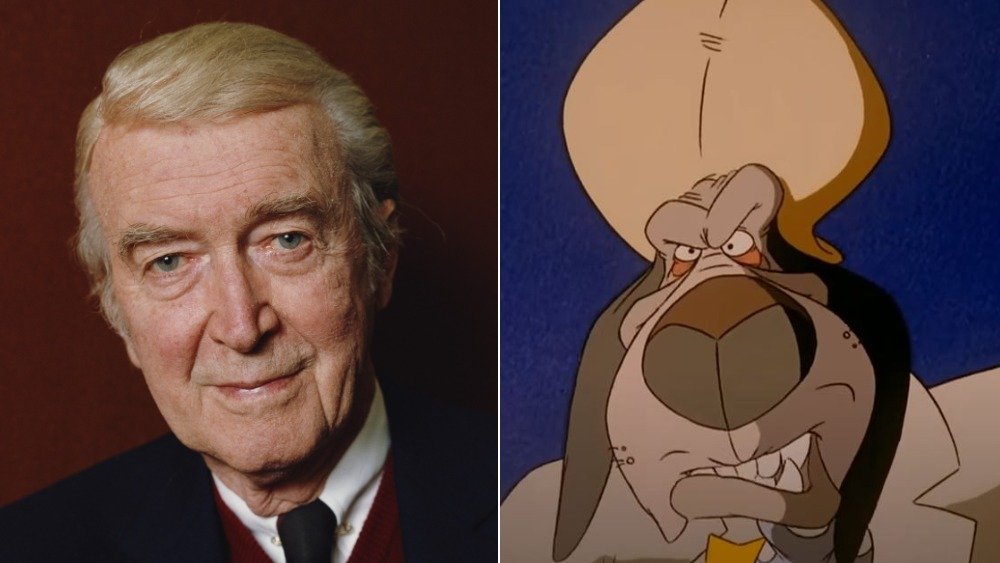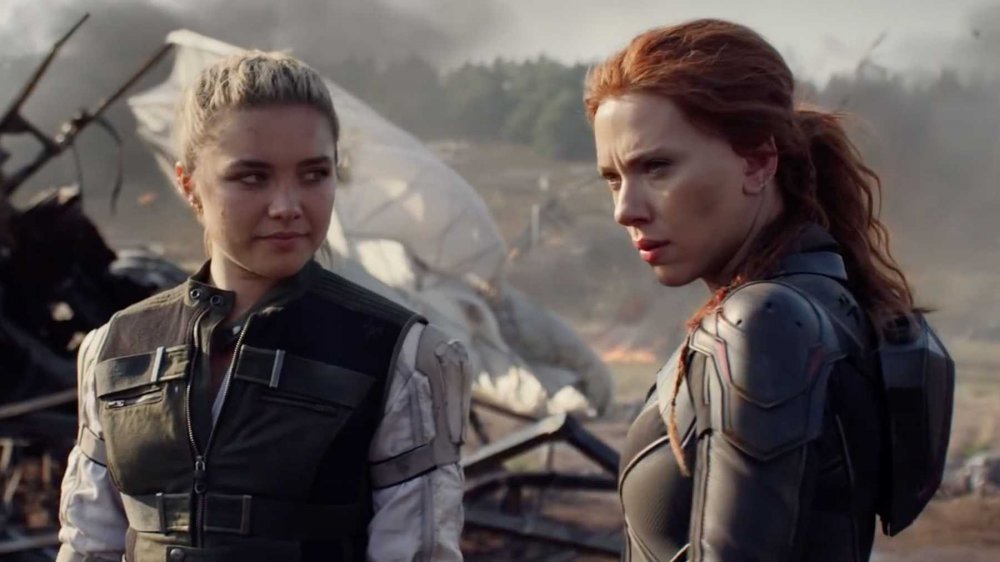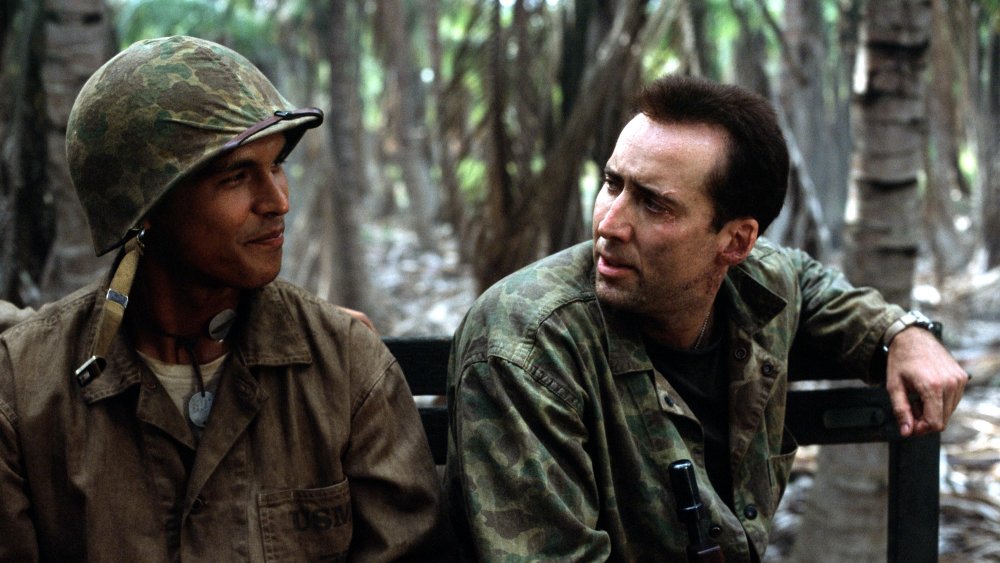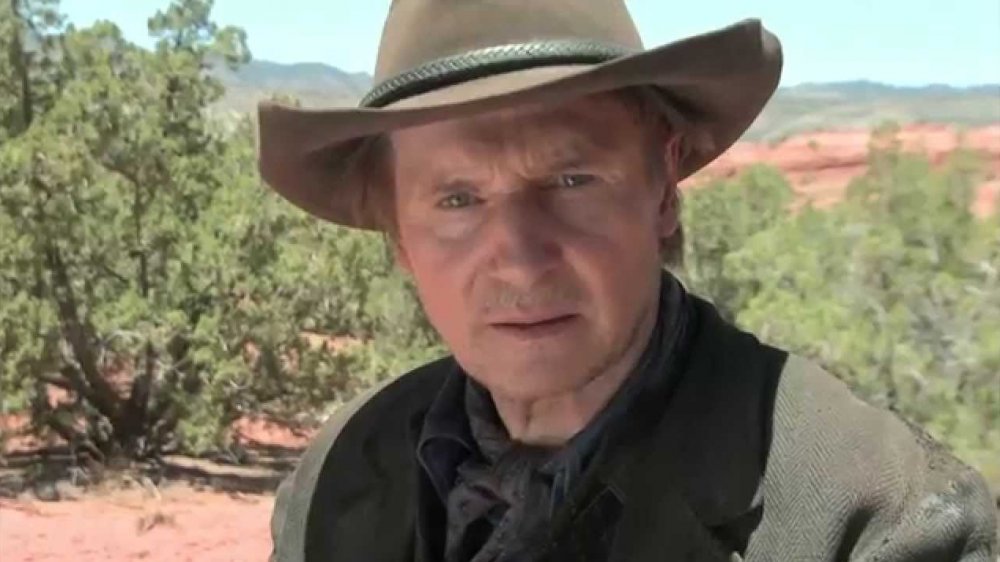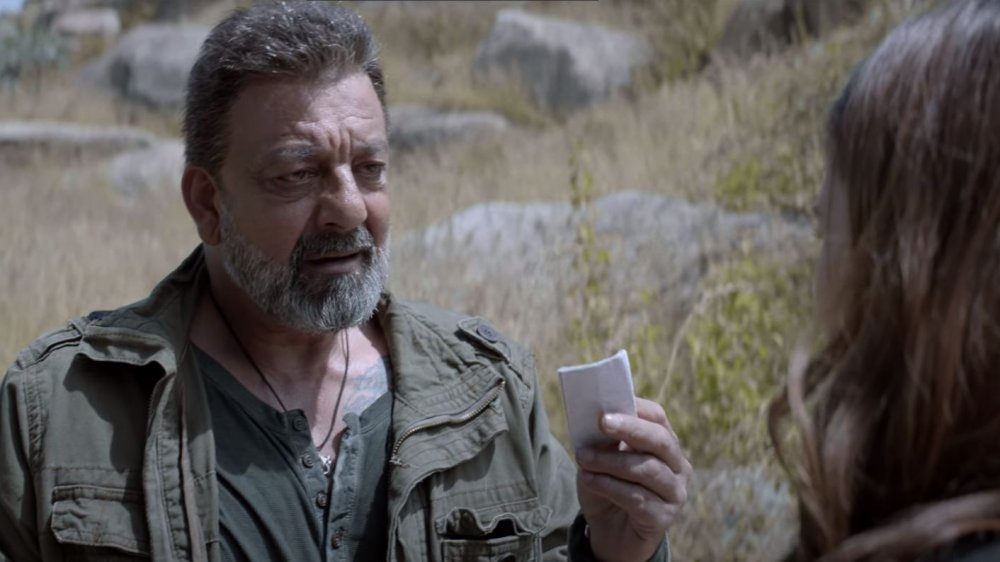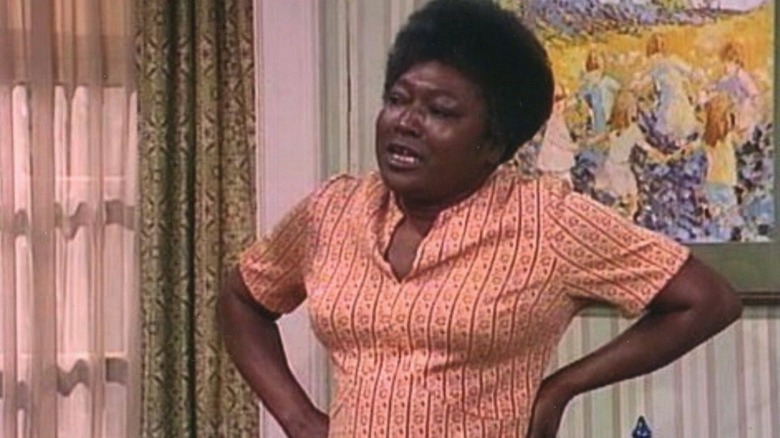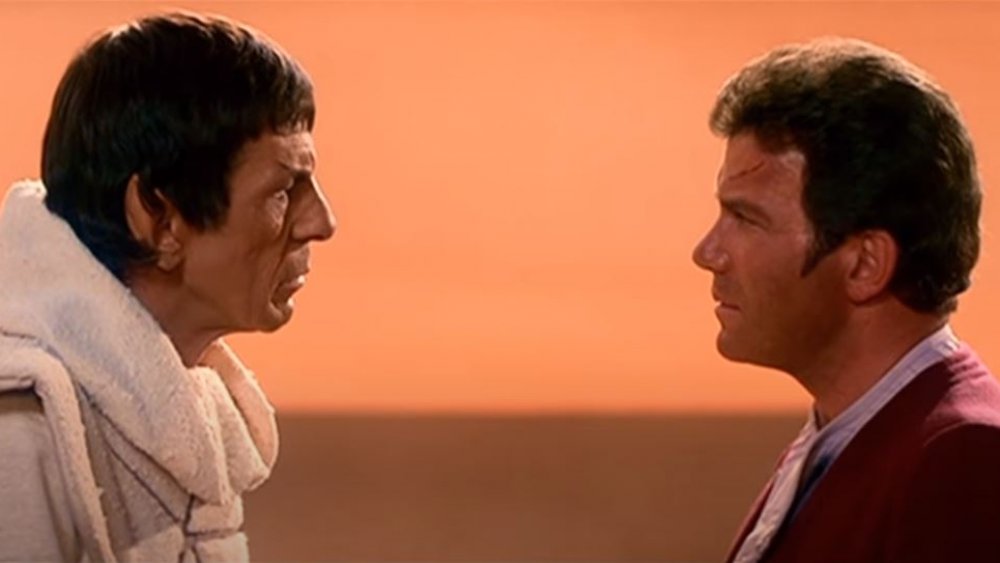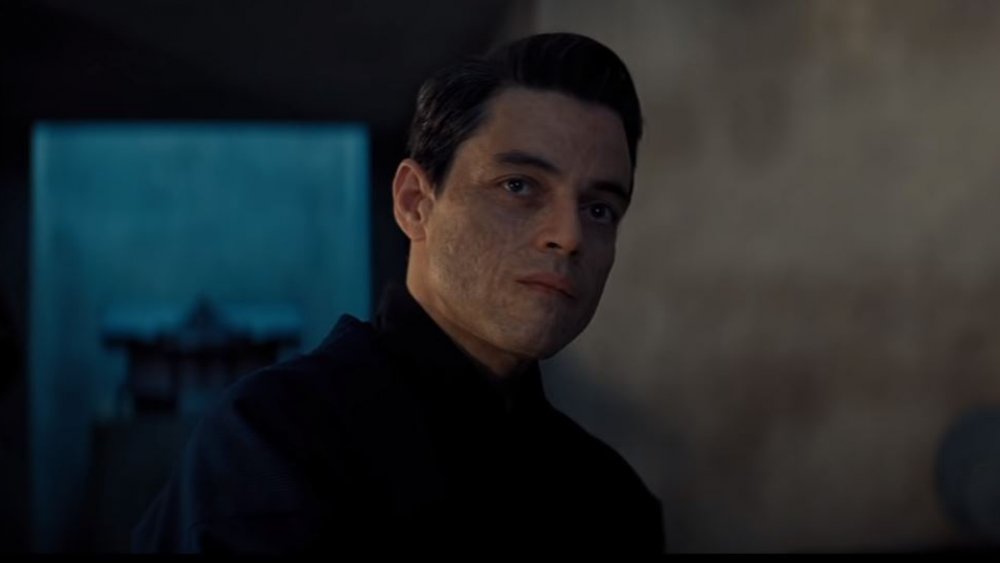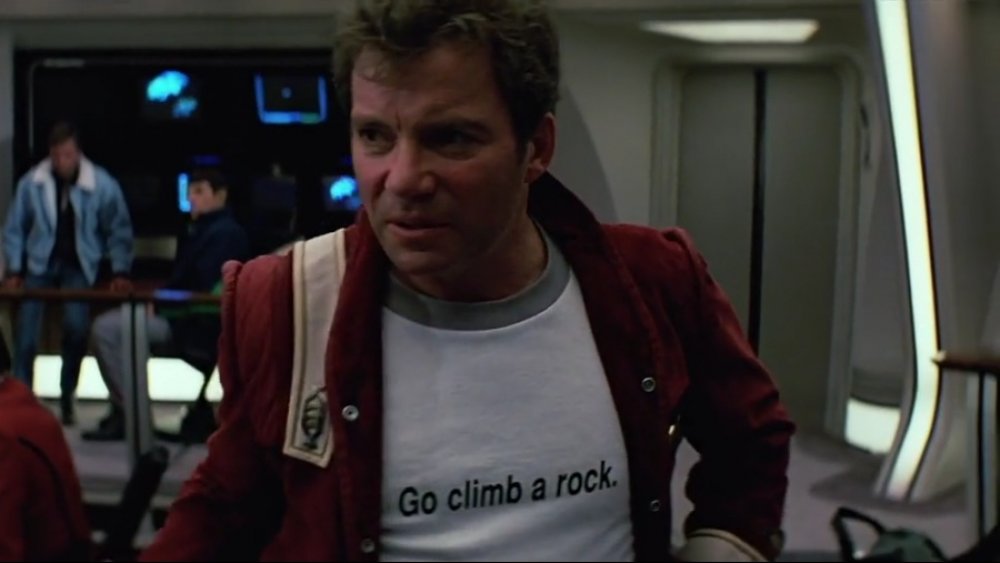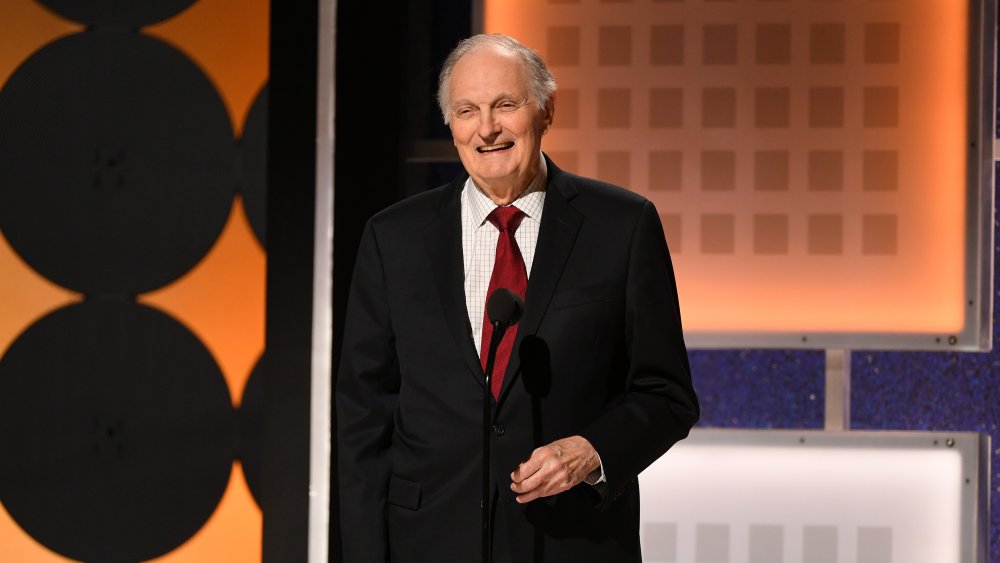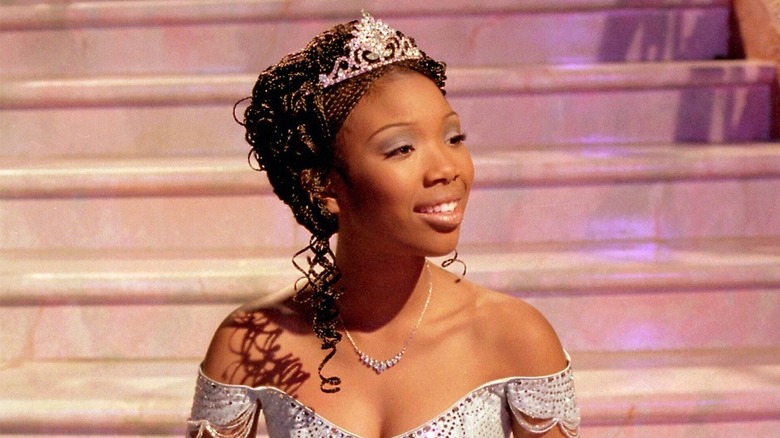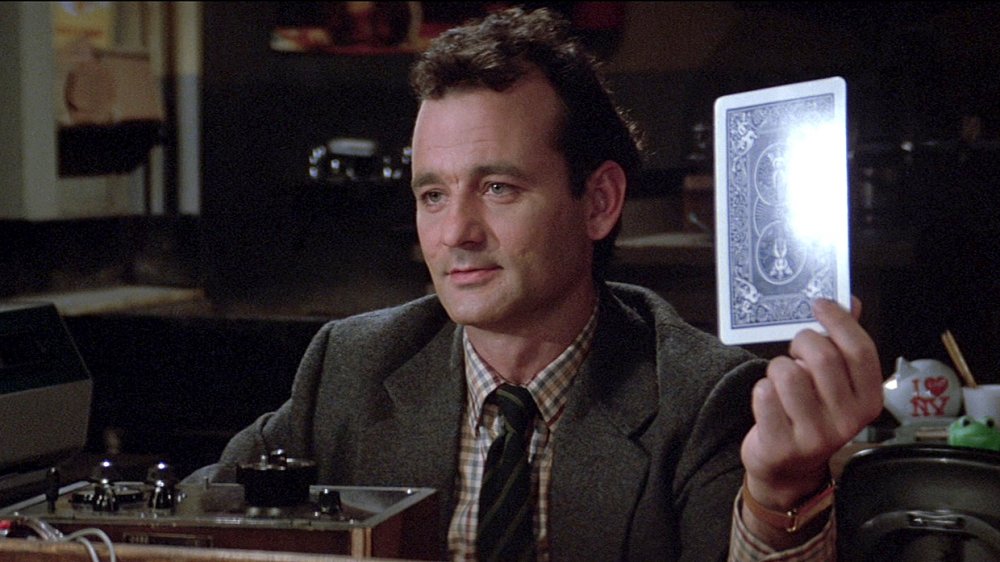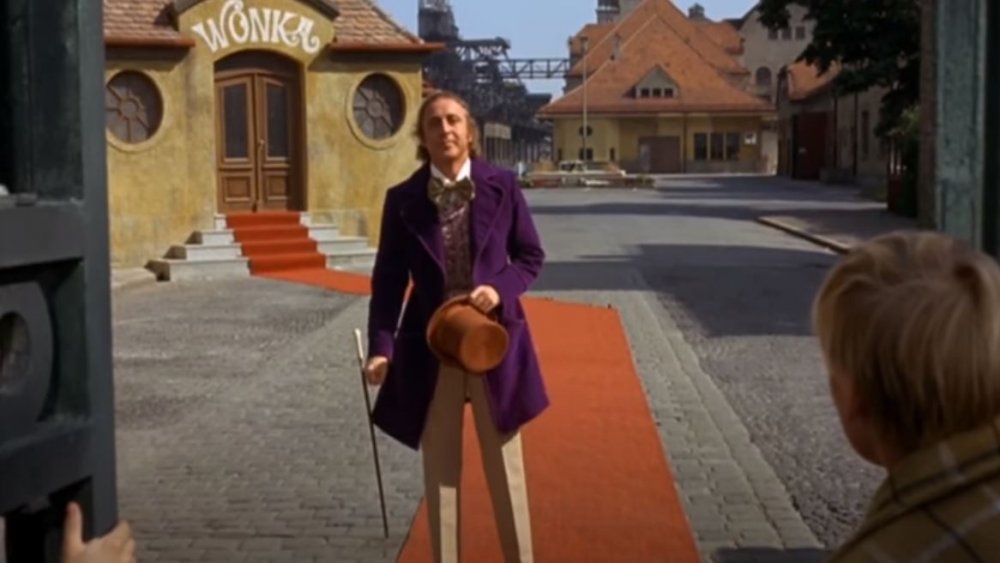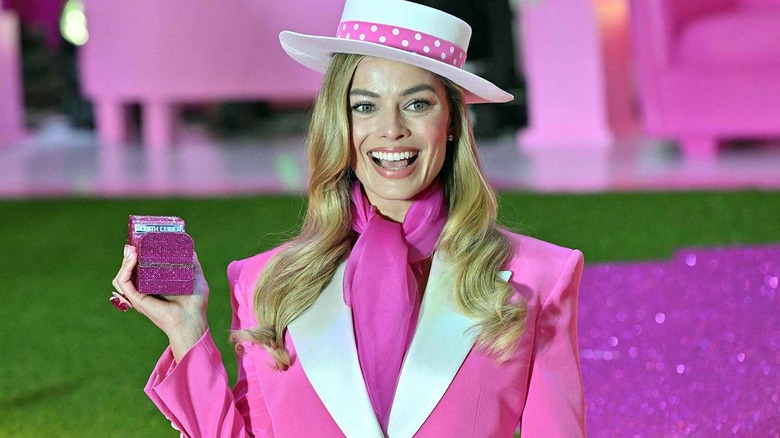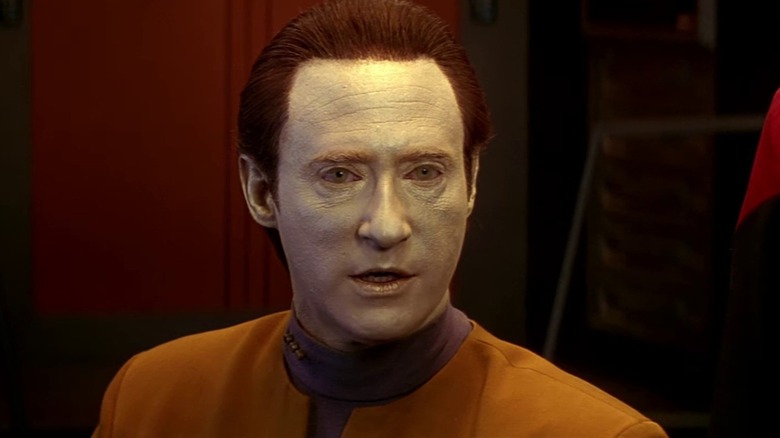The One Demand These Actors Had Before Accepting A Role
Acting is a job — it's called "show business" for a reason. Actors, especially ones who aren't superstars, take the jobs they get and have to deal with it. Occasionally, however, actors can get a bit of leverage before accepting a role, and with that leverage comes conditions. Usually, that means a little more money here, a little more input there. It's all standard contract negotiations, nothing special, no story.
Other times, it comes down to one very specific detail — a single demand or request. That, on the other hand, is a story. Sometimes that demand is about the way a character is portrayed, maybe adding a scene or two. Occasionally, it's a promise that their character will be treated in a certain way. Every now and then, it's a demand for some serious creative control. Either way, it's an intriguing look into the minds of some of our more interesting actors. From hiring particular people to dietary dictates, here are the demands these actors had before taking roles.
James Stewart wanted Spielberg in the studio with him
When Steven Spielberg produced "An American Tail: Fievel Goes West," he had someone in mind for Sheriff Wylie Burp — movie icon Jimmy Stewart. It's easy to see why. Spielberg's career took off as Stewart's was winding down, and this would certainly be their only chance to work together. And he got a "yes," with a condition.
Stewart had largely retired from acting around 1980. He still had the odd TV spot and did voiceover for Campbell's Soup commercials, but he was doing more retrospectives than new work. He made 78 movies in his career, so it's hard to blame him for sitting down. But Spielberg wanted to make it 79.
According to the Los Angeles Times, Spielberg met Stewart at a party, and the director asked the actor to play a part in "Fievel Goes West." Stewart had one condition — Spielberg himself had to be in the studio, providing direction. Spielberg agreed and spent 10 days directing the legendary actor at Interlock Studios in Hollywood.
Florence Pugh didn't want someone else watching her diet
Playing a superhero often requires grueling workouts and dieting. This was true for Scarlett Johansson when she played Black Widow, but while getting a superhero bod is part of the job, it can also be excessive and cause a lot of unnecessary stress, given that movies are fake in the first place and stunt people do most of the heavy lifting. So when Florence Pugh signed on to play Yelena Belova in "Black Widow," she had one demand — nobody would control her body but her.
As Pugh explained to Elle, when she got the call, she wanted to know what "the [fitness] regime was" and "whether it was them or me calling the shots." This was vitally important. "I didn't want to be part of something where I was constantly checked on," she said, "and people making sure I was in the 'right' shape. That's not me at all." Pugh even brought her own food to set, despite Johansson offering food from her own private chef. Pugh liked the chef and understood the importance of having one when needing to track nutrients, but she found doing her own cooking far more relaxing.
Adam Beach wanted the Navajo Nation's permission to play a code talker
Adam Beach has long been one of the most prominent Indigenous actors in Hollywood. A member of the Anishinaabe Nation, one of the First Nations in Canada, he's spoken out against whitewashing Native roles in Hollywood movies. He also walks the walk, and on at least one occasion, he put a condition in place before taking a role
Beach was cast in John Woo's "Windtalkers," a movie about Navajo code talkers during World War II, opposite Nicolas Cage. It was a huge role, one that could have possibly vaulted him into the mainstream. But before he took the part, he had a demand. Beach insisted that the Navajo Nation had to approve him playing the role. This was a tremendous risk for his career but one he had to take.
The Navajo Nation approved his casting, but they added a condition of their own. For the role of Beach's friend, another code talker, the studio had to hire an enrolled member of the Navajo Nation. Roger Willie got the job, and also taught Beach about the history of the Navajo people, with the two forming a bond offscreen.
Liam Neeson demanded a Family Guy joke turn into reality
Liam Neeson generally plays good guys, but in Seth MacFarlane's "A Million Ways to Die in the West," he plays the villainous cowboy Clinch Leatherwood, a gunfighter with a heavy Irish accent. Interestingly, the brogue was Neeson's call, based on a joke that aired years earlier on MacFarlane's "Family Guy," and it was his one demand before accepting the role.
Neeson was mocked during a cutaway gag in" a "Family Guy" episode from 2006. In the show, Peter says he'll be as "hopeless as Liam Neeson when he tries to play an American cowboy," and it cuts to a scene of where Neeson plays a cowboy in his Irish accent. This would have escaped Neeson's attention entirely if his sons didn't tell him about it.
Years later, during pre-production of "A Million Ways to Die in the West," MacFarlane called Neeson and asked him to play a cowboy. Neeson, not forgetting the joke all these years later, told Today that he said, "I'll do it on condition that I do it in a very broad Irish accent." MacFarlane agreed.
Sanjay Dutt wanted his old director back
The making of "Sadak 2" is the story of two titans of Hindi cinema — Sanjay Dutt and Mahesh Bhatt.
Dutt is one of the most iconic actors in India, having been a critical darling and top box office draw for over three decades. Bhatt is one of the most highly regarded art house directors on the subcontinent. The two have a strong partnership, having made a half dozen movies together, including "Sadak" in 1991. Inspired by Martin Scorsese's "Taxi Driver," "Sadak" tells the story of a disturbed cab driver who falls in love with a 'prostitute.' It was one of the biggest hits of the early '90s in India.
Bhatt retired from directing in 1999 but kept on writing. At some point Dutt — still acting, still a major star — floated the idea of a "Sadak 2" among his former co-stars. Bhatt came on board to write the script, but it was then that Dutt made his one condition known. Either Bhatt would come out of retirement to direct it, or Dutt would walk. Thus, Bhatt directed his first movie in over 20 years.
Esther Rolle demanded Florida Evans be a well-rounded character
The child of sharecroppers, Esther Rolle's father made her promise never to be a domestic servant. "I can't protect you in other people's houses," he said. Rolle got a kick out of this, given that she became famous as maid Florida Evans on "Maude." Of course, she had one demand before she accepted the role that made her famous.
Rolle was working on Broadway when Norman Lear, one of TV's all time biggest hitmakers, asked her to star as a maid on "Maude." Lear's shows were progressive for their era — and remain so to this day — but it was fair for Rolle to be concerned. As such, Rolle only agreed after Lear guaranteed she'd play a well-rounded character instead of the kind of stereotypical maid seen in many Hollywood productions up to that point. Thus, the role of Florida Evans was cast.
Lear kept his promise. Florida took no guff and regularly challenged Maude, often mocking Maude's performative liberal attitude. Florida was so popular that after only two years on "Maude," the Evans family got their own spinoff with "Good Times."
Leonard Nimoy came back as Spock for a chance to direct
By the early 1980s, Leonard Nimoy was over Spock. He was the most popular character during the original run of "Star Trek," syndication meant nobody would forget it, but the writing for Spock in "Star Trek: The Motion Picture" was abysmal. Nimoy famously titled his 1979 autobiography "I Am Not Spock," and he wanted to focus on his then-current Broadway work. Producer Harve Bennett only roped Nimoy back into the role for "Star Trek II: The Wrath of Khan" by promising a moving death scene.
"Star Trek II" ended up as a huge success, and it revitalized Nimoy's affection for his character. In his second autobiography, appropriately titled "I Am Spock," Nimoy outlined the one condition he mapped out for reprising the character.
During a private screening of "Star Trek II," Nimoy saw Spock's burial tube on the Genesis planet and quickly surmised he'd get a call from Paramount. While waiting to meet with executives, Nimoy remembered that he and William Shatner had asked for chances to direct back in the TV days but were flatly denied. Looking for a new challenge and realizing he had the leverage, Nimoy said he'd only return for "Star Trek III" if he could direct. They accepted his proposal immediately. Nimoy would go on to direct the next two "Trek" features.
Rami Malek had conditions for playing a terrorist
Fresh off winning Best Actor at the Oscars for playing Freddie Mercury in "Bohemian Rhapsody," Rami Malek was one of the biggest stars in the world. This meant he was in demand, and it also meant he had some leverage. So when he was offered the role of Safin in "No Time To Die," he had a demand in place before agreeing.
As with many Bond villains, Safin could be classified as a terrorist. Malek, who's proud of his Egyptian heritage, had reservations about playing a character with that label. Before Malek accepted the role (via the Daily Mirror), he told director Cary Joji Fukunaga, "We cannot identify [Safin] with any act of terrorism reflecting an ideology or a religion. That's not something I would entertain, so if that is why I am your choice then you can count me out." Fukunaga made it clear that wasn't his vision, and Malek gladly took the role.
William Shatner demanded to direct a Star Trek movie
During the initial run of "Star Trek: The Original Series" — or, as it was simply known then, "Star Trek" — William Shatner and Leonard Nimoy put so-called "favored nations clauses" in their contracts. This meant that whatever one got — pay raises, control over scripts, so on — the other got as well. Years later, Shanter would cash in on this as his one condition for returning.
While the first "Trek" movie made money, "Star Trek II: The Wrath of Khan" kicked off the show's second life as a movie franchise. "Star Trek III: The Search For Spock" and "Star Trek IV: The Voyage Home" saw Nimoy direct, which is where Shatner spotted his opening. After "The Voyage Home," Shatner had a pay dispute about the next movie. He also had one major condition. Either they let him direct like they did with Nimoy, or they'd make the movie without Kirk. Given that the latter wasn't an option, Paramount gave him the reigns. "Star Trek V: The Final Frontier," with Shatner at the helm, is now regarded as one of the worst "Star Trek" movies, and even Shatner himself regrets it.
Alan Alda wanted to interview scientists, not introduce them
After "M*A*S*H" — that is, after "M*A*S*H" ended, not the spinoff "AfterMASH" — Alan Alda was offered countless roles. One such role wasn't a character but a host. See, PBS wanted him to host "Scientific American Frontiers," a show about new technology and breakthroughs in science and medicine, featuring interviews with scientists. Alda was a lifelong admirer of science, but he wanted to do more than just introduce segments. But Alda had one condition for signing on. He had to conduct the interviews himself. The executives agreed, and he went on to host the program for over a decade.
Alda's genial but precise interview style — he claims that he approached every episode like he was trying to solve a mystery — earned praise. Hosting the show also taught him an important lesson. Many scientists don't know how to talk with the average person. This led to his lifelong advocacy for science communication. His campaigning produced legit results, including Stony Brook University opening the Alan Alda Center for Communicating Science in 2009.
Brandy wanted Whitney Houston as her Fairy Godmother
Hot off "The Bodyguard," Whitney Houston was at a commercial peak in the early '90s, and she was looking for more ways to capitalize on it. At some point, she pitched Disney on the idea of playing Cinderella. They were receptive, but the movie kept getting delayed, first because of touring and then because Houston got married and had children. No longer "feeling quite like Cinderella," as she explained to Jet, Houston decided someone with more "wonder and innocence" should take the role. She had someone in mind, and that someone had a demand before saying yes.
Houston recommended actress-singer Brandy, who was starring on sitcom "Moesha" at the time, for the role of Cinderella. Houston reached out, and Brandy was receptive, with one condition. Brandy would only take the role if Houston herself — a longtime idol — would play the Fairy Godmother. Houston agreed, and Disney started production on one of the best-regarded adaptations of "Cinderella" in recent memory.
Bill Murray leveraged Ghostbusters to fund his passion project
Bill Murray had a passion project in the early 1980s — a movie adaptation of W. Somerset Maugham's novel "The Razor's Edge." There was a successful adaptation starring Tyrone Power in 1946, but Murray wanted to make it his own. Written with his friend, John Byrum, who would go on to direct it, the project represented Murray's desire to try drama and expand his creativity. However, there was one problem. They couldn't get financial backing. This problem was remedied after Murray did a little Hollywood horse-trading ... and accidentally landed an iconic role.
Around the same time, Harold Ramis and Dan Aykroyd were putting together a little movie called "Ghostbusters" at Columbia Pictures, but they were having a hard time nailing down another lead actor. So, Murray made a deal. He'd sign on to "Ghostbusters" only if Columbia would finance "The Razor's Edge." The terms were accepted. "The Razor's Edge" bombed and received mediocre reviews, but it's hard to talk about Murray without mentioning "Ghostbusters" today.
Gene Wilder wanted a scene added for Willy Wonka
In the late 1960s, director Mel Stuart was casting "Willy Wonka and the Chocolate Factory." Fred Astaire and Joel Grey were contenders for the title role, and it's easy to imagine another world where either of them got it and played the role admirably. In our world, however, one man blew Stuart away at the audition — Gene Wilder. Largely known for "The Producers," which wasn't a huge hit in its era, Wilder couldn't touch the others for star power. Stuart, however, was so convinced by Wilder's take that he chased down Wilder afterwards to say, "As far as I'm concerned, you've got it."
As Wilder told The Hollywood Reporter, Stuart later came to Wilder's home in New York to offer the part personally. Wilder agreed, but he had one demand. He wanted a scene added to the script. As he explained, "I can come out, and all the crowd quiets down, and I am using a cane. Oh, my God. Willy Wonka is crippled. And I walk slowly, and you can hear a pin drop. And my cane gets stuck in a brick. And I fall forward onto my face and do a forward somersault and jump up, and they all start to applaud.'"
A confused Stuart asked for an explanation. Wilder responded, "Because no one will know from that point on whether I am lying or telling the truth." By demonstrating such a deep understanding of the character, in addition to this being an actual demand, Stuart said yes.
Margot Robbie wanted more Barbies in Barbie
Many expected "Barbie" to be a big hit, but few probably thought it would be a billion-dollar blockbuster. Nevertheless, it was a perfect storm of Hollywood genius: a blend of Greta Gerwig's brilliant writing and directing, the colorful cinematography of Rodrigo Prietro, and of course its impeccable cast led by Margot Robbie. Believe it or not, though, Robbie almost didn't accept the title role, and her one demand is probably the exact opposite of what one might expect from a major movie star: Robbie wanted other actresses to play Barbie.
"If [Mattel] hadn't made that change to have a multiplicity of Barbies, I don't think I would have wanted to attempt to make a Barbie film," Robbie told Time magazine. But it wasn't as simple as wanting more actors: it was also the kind of message she wanted the film to convey. "I don't think you should say, 'This is the one version of what Barbie is, and that's what women should aspire to be and look like and act like,'" Robbie added.
As it happens, it was sending the right message that attracted stars like Issa Rae, who plays President Barbie in the film. "Barbie Land is perfect, right? It represents perfection," Rae said. "So if perfection is just a bunch of white Barbies, I don't know that anybody can get on board with that." Ultimately, a variety of actors portrayed a diverse group of Barbies in the film, including Kate McKinnon, Hari Nef, Dua Lipa, and Alexandra Shipp.
Brent Spiner was looking beyond Star Trek: Generations
Brent Spiner played the android Commander Data on "Star Trek: The Next Generation," and when the series moved to the silver screen, it was probably assumed that he'd accept whatever deal was offered. After all, in the 1990s it wasn't as common for TV actors to get the opportunity to star in a major motion picture. Nevertheless, Spiner had one demand before he agreed to put on the gold face paint and reprise the role, as he revealed on Michael Rosenbaum's podcast, "Inside of You."
"They had a contract, they had it all worked out," Spiner said. But he knew he had rare leverage because the script was written and shooting was set for two weeks later. That's when he made an unusual demand, insisting that in addition to a bump in salary, he wanted the studio to find him a role in another movie. "There has to be something that's not 'Star Trek' that Paramount Pictures is doing," he recalled telling the studio. He added that there was a clause in the deal that if they didn't find another role he'd get a bonus payout.
Rosenbaum then guessed that the other role was Dr. Okun in "Independence Day," but Spiner said that wasn't the case. "In fact, before [the negotiations] came to a finish I had already gotten 'Independence Day' so I didn't really care." Ultimately, Paramount never found him another part and simply paid him his contractual bonus.
